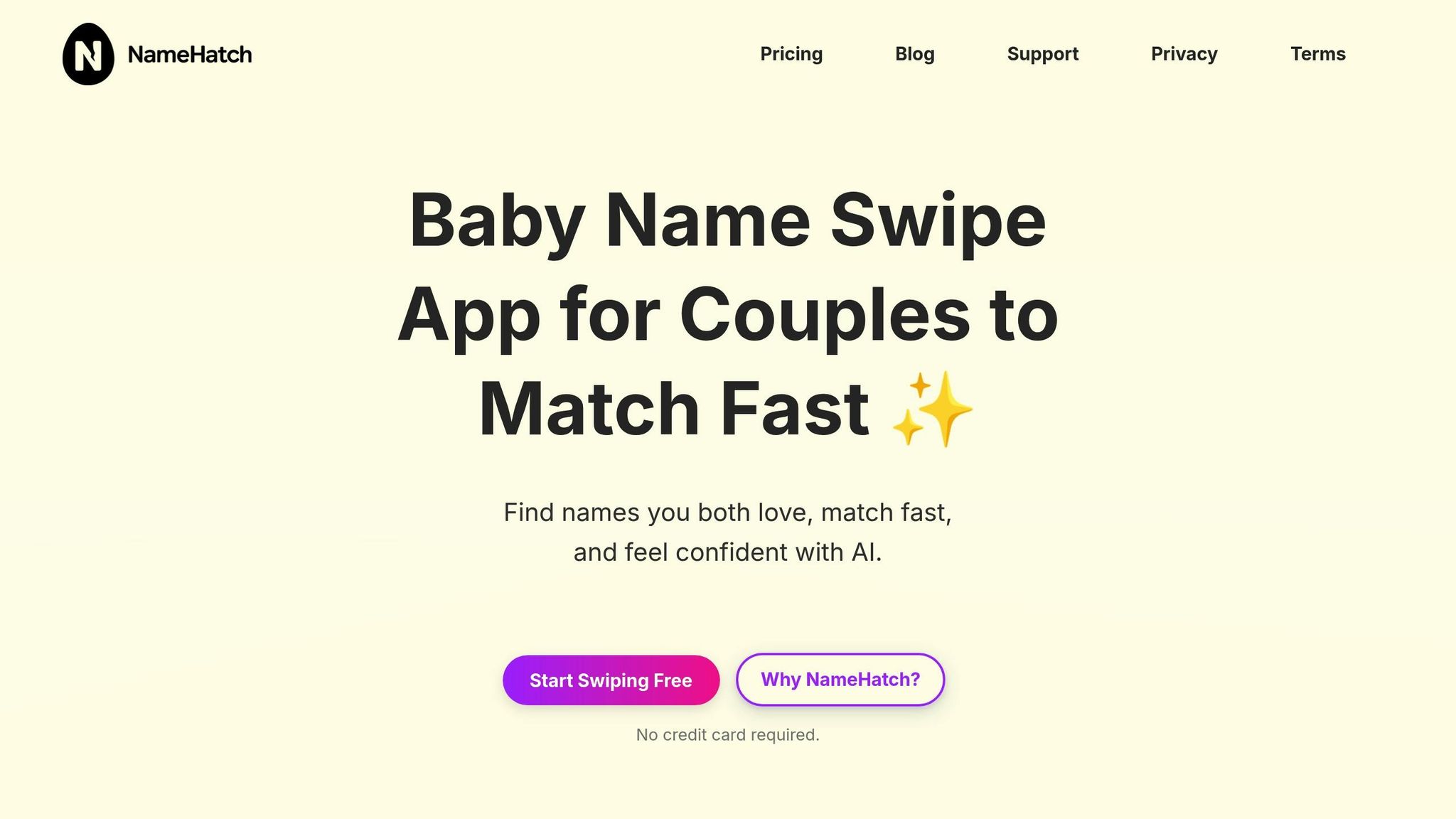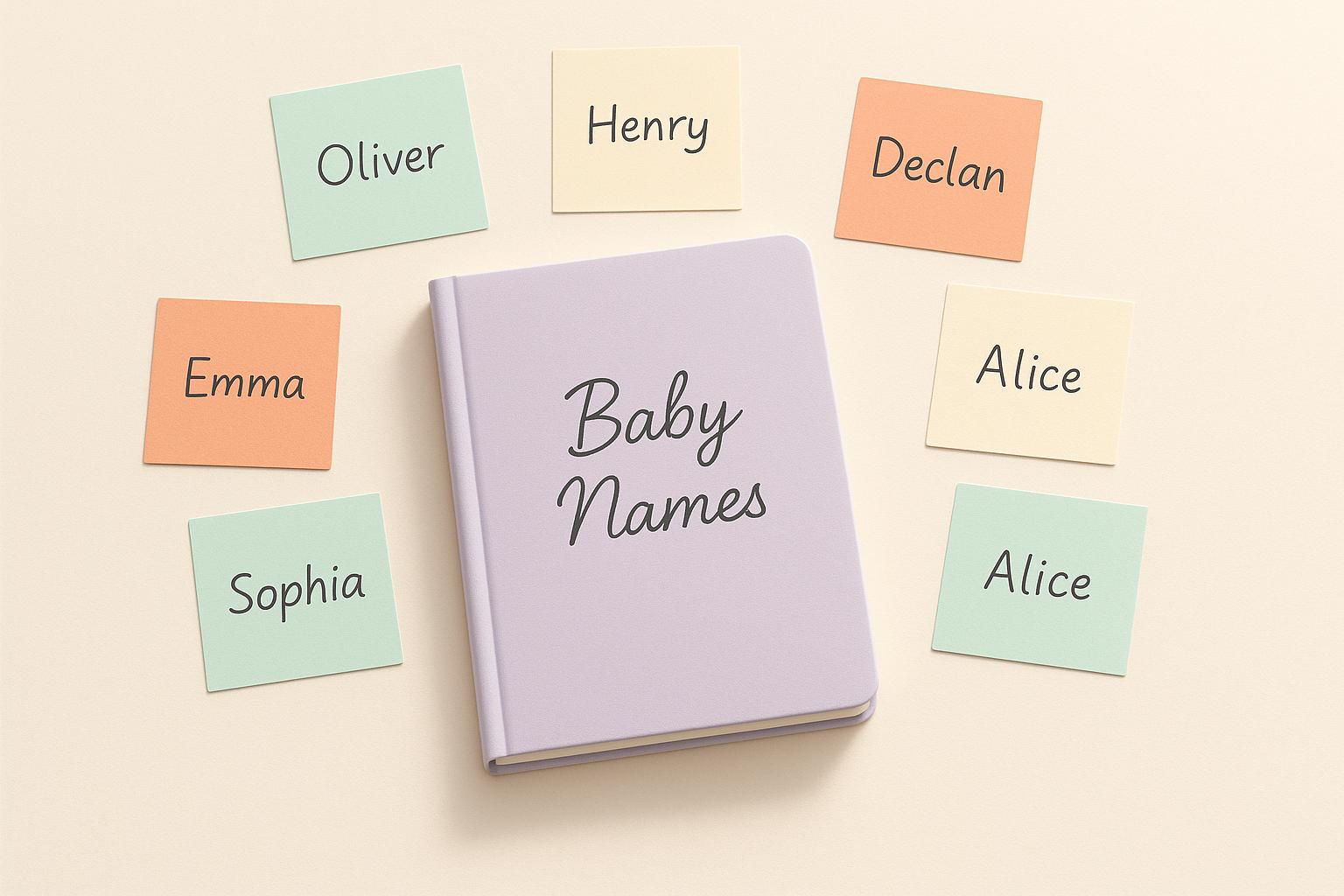Choosing a baby name is an emotional process influenced by personal memories, societal norms, and subconscious factors. Research shows that names shape identity, social interactions, and even career opportunities. Emotional biases - like the "name-letter effect" or associations with past experiences - play a significant role in these decisions, often leading parents to regret their choices later. Studies reveal that 1 in 5 parents regret their baby’s name, with reasons ranging from unusual spellings to negative reactions.
Key insights:
- Names affect first impressions, with simpler names often perceived more positively.
- Unusual names can encourage individuality but may lead to social challenges.
- Emotional bias stems from personal experiences, hidden preferences, and societal expectations.
- Tools like NameHatch can help couples navigate the naming process collaboratively by reducing emotional intensity.
Ultimately, balancing emotions with practical thinking and open communication helps parents make confident, meaningful choices.
Naming A Baby
What Causes Emotional Bias in Name Selection
The process of choosing a name might seem straightforward, but it's often influenced by deep-seated emotional biases. These biases stem from three main sources: personal experiences, subconscious psychological tendencies, and the weight of societal and traditional expectations.
Personal Experiences That Shape Name Choices
Names often carry the weight of our personal histories. Parents, for instance, frequently choose names based on positive or negative memories tied to them. A pleasant memory, like a kind teacher named Emma, can make a name appealing, while a negative experience with someone named Kevin might create an instant dislike.
Take the case of a mother who named her daughter Lilah after a cherished childhood friend. Her son, William Austin, carried names with family significance - William for her husband’s grandfather and Austin for her own. Sometimes, inspiration strikes from less personal sources, like a favorite book character or a name from a TV show.
"We attach huge importance to baby names because they carry identity, meaning and emotion... Our name is usually the first thing people learn about us [and] can reflect culture, family history or aspirations, so choosing one feels like a big responsibility." - Naomi Magnus, psychotherapist and founder of North London Therapy Practice
The challenge is that everyone brings their own associations to the table. Emiliana Hall, doula and founder of The Mindful Birth Group, explains:
"Everyone has associations with names, from schoolmates to celebrities, and those opinions can spill out, even unintentionally"
Beyond personal stories, our unconscious mind also plays a significant role in shaping preferences.
The Name-Letter Effect and Hidden Preferences
Some naming biases operate beneath our conscious awareness. For example, research has shown that implicit egoism - our subconscious preference for things that resemble ourselves - can influence major life decisions. Girls with gender-neutral names, for instance, are more likely to excel in math and science, while boys with similar names may face more behavioral challenges and lower academic outcomes.
"The most important anchorage to our self-identity throughout life remains our own name." - Gordon Allport, one of the pioneers of personality psychology
Even something as simple as how easy a name is to pronounce can shape first impressions, with simpler names often being viewed more favorably.
How Society and Traditions Shape Naming
Cultural norms and traditions heavily influence naming practices, often dictating what is considered acceptable or desirable. In Russia, for instance, names are frequently chosen in honor of saints based on the child’s birthdate. In Spain, individuals typically have one given name but carry two family names - one from each parent. Meanwhile, Korean naming traditions prioritize the family name, placing it before the given name(s).
In North America, naming trends tend to ebb and flow like fashion. A teacher once observed that in the 1960s, French-inspired names were popular for girls, leading to classrooms full of Nicoles, Michelles, and Natalies by the 1970s. Boys of the same era often bore traditional Anglo-Saxon names like John and Robert or Biblical names such as David and Paul.
Today, modern parents often grapple with a unique dilemma: how to choose a name that feels distinctive while still fitting societal norms. This balancing act often results in slightly altered versions of popular names.
For immigrant families, the decision becomes even more layered. They must weigh the importance of preserving traditional naming customs against the desire to integrate into their new cultural environment. For example, in Cecilia Huang’s husband’s family, it was customary for the paternal grandfather to select Chinese names for great-grandchildren, often with meaningful characters like "shining beauty".
"Since a good or bad name has the potential … to produce good or bad results, I suggest parents should try all ways to give their baby a good name in terms of their own culture." - Huajian Cai, Institute of Psychology in Beijing
These personal, psychological, and societal forces all contribute to the emotional weight behind naming decisions, shaping how we perceive and choose names.
Research Findings: Emotional Bias and Long-Term Effects
The influence of emotional bias in naming extends far beyond the moment a name is chosen. These decisions can shape a child’s social experiences and even affect how parents feel about their choice years down the line.
How Names Affect Children's Social Lives
A name is more than just a label - it plays a key role in forming a child’s identity, impacting how they see themselves and how others perceive them. The Pygmalion effect, for example, demonstrates how expectations tied to a name can influence behavior.
Incredibly, people form impressions of others based on their names in as little as 1/10 of a second. This snap judgment can significantly shape a child’s social interactions. Kids with names that are easy to pronounce often find it easier to build friendships, while those with more complex names might face social challenges, including isolation. Names reflecting cultural heritage can also lead to teasing, pushing some children to distance themselves from their roots by altering their names.
Stereotypes associated with certain names can go beyond social interactions, affecting educational opportunities and even career paths. Difficulties with name acceptance may lead to struggles in social adjustment, sometimes manifesting as aggression, withdrawal, or social anxiety.
When Parents Regret Their Name Choices
Naming regret is more common than many might expect. Studies reveal that 9% of mothers regret the name they chose for their child, while another 10% feel the name doesn’t align with their child’s personality. Among these parents, 15% reported feeling regret within the first month, and 21% experienced it within the first year.
External criticism can amplify these emotions. About 15% of mothers who regretted their child’s name cited negative reactions, such as mockery or disapproval, as a contributing factor. The regret can be so intense that 6% of these mothers have legally changed their child’s name.
Effects of Unusual and Non-Traditional Names
Choosing a unique or unconventional name can be a double-edged sword. A British study found that one in five parents regretted picking an unusual or oddly spelled name due to unexpected social reactions or practical challenges. For instance, children with non-traditional spellings of common names may face difficulties in learning to spell and read.
On the flip side, rare names can sometimes encourage individuality. Research suggests that children with unique names are more likely to pursue non-traditional career paths. However, dissatisfaction with an unusual name - or the perception that it’s odd - can make social adjustment harder, as noted by Jean Twenge from San Diego State University.
Interestingly, uncommon names can also influence leadership styles. Studies reveal that CEOs with distinctive names often see themselves as different from their peers, which can drive them to adopt unconventional strategies. David Zhu, a professor at Arizona State University, explains:
"Common and uncommon names are both associated with advantages and disadvantages, so expectant parents should be aware of the pros and cons no matter what types of names they give to their child."
These findings underline the far-reaching effects of emotional bias in naming and highlight the importance of thoughtful decision-making in this process.
sbb-itb-f13f980
How to Manage Emotional Bias When Choosing Names
Recognizing how emotional bias influences naming decisions is just the beginning. The real challenge is finding ways to manage these biases so both partners can make thoughtful, balanced choices that feel right in the long run.
Working Together on Name Decisions
Managing emotional bias starts with open communication and teamwork. When couples treat naming as a shared journey rather than a source of conflict, the process becomes smoother and less stressful.
Active listening, as emphasized by Lizzette Potthoff, along with reflective feedback, helps partners understand and appreciate each other’s emotional connections to certain names. Name preferences often tie deeply to personal identity, so if one partner dismisses a beloved name, it’s important not to take it personally. Instead, explore the emotional reasons behind each choice to make decisions that feel more informed and mutual.
It’s also crucial to set clear boundaries with family members. Agreeing to limit external input can keep the focus on what matters most to you as a couple. Tammy Gold, a Licensed Therapist and Parenting Coach, advises:
"Don't share if the feedback could be upsetting"
If tensions remain high, professional counseling might help. Peta-Gaye Sandiford, a Mental Health Counselor, suggests:
"It may help to seek counseling to find ways to resolve the tension"
Technology can also play a role in managing emotional bias and balancing preferences.
Using AI Tools to Balance Personal Preferences
Alongside open dialogue, AI tools can bring objectivity to the process. These tools help couples step back from knee-jerk emotional reactions and focus on a broader range of options that align with shared preferences.
By reducing emotional intensity, digital platforms encourage exploration of names from diverse sources and meanings, helping couples move beyond immediate associations. This approach creates opportunities to discover names that resonate with both partners.
NameHatch Features for Better Decision-Making

Platforms like NameHatch simplify the naming process by offering features designed to ease tension and encourage collaboration. Its swipe-based discovery system allows each partner to review names individually before comparing preferences. This reduces the pressure that can lead to defensive reactions.
The partner matching feature, with real-time alerts, highlights names both partners like without forcing lengthy debates. This aligns with expert advice to avoid rushed decisions and give the process the time it deserves. When both partners independently favor the same names, it provides a natural starting point for deeper discussions.
NameHatch’s smart filtering system goes beyond surface-level preferences. Couples can explore names based on traits like Classic, Modern, Soft, or Strong. Premium categories such as Nature-Inspired, Global, Mythical, and Unique encourage exploration of diverse traditions and creative compromises.
The platform’s AI-powered personalized suggestions adapt to each couple’s preferences over time, offering more tailored options as they refine their choices. This structured, collaborative environment mirrors expert recommendations for using tools to streamline decision-making. Features like saving, revisiting, and sharing favorite names also allow couples to take their time, reassess options, and make confident decisions as their preferences evolve.
Conclusion: Making Better Name Choices Together
Picking a baby name is no small task - it’s a decision packed with emotions and meaning. Studies reveal that emotional biases often play a big role in this process, and sometimes these biases can lead to second-guessing later on.
The best way to approach this is by acknowledging those biases and working as a team. Take the time to really listen to each other, share your emotions openly, and avoid making rushed decisions. Research suggests that taking your time, whether it’s waiting until the pregnancy feels more tangible or even meeting your baby first, can bring the clarity needed to feel confident about your choice.
To help keep emotions in check and expand your options, modern tools can be a game-changer. Apps like NameHatch offer features like swipe-based selection, smart filters, and partner matching to encourage couples to explore beyond their initial instincts. With AI-powered suggestions that adjust to your preferences, these tools offer a fresh perspective while keeping the process collaborative.
Ultimately, the goal isn’t to remove the emotional connection from naming - those feelings are what make a name meaningful. Instead, it’s about striking a balance: blending heartfelt sentiment with practical thinking and open dialogue. With patience, thoughtful communication, and the right tools, couples can make choices that feel right for years to come.
FAQs
How can parents choose a baby name that balances emotions and practicality?
Choosing a baby name often involves balancing emotion and practicality. Think about how the name ties into your personal connection, family traditions, or even shared values. At the same time, consider practical aspects like its ease of spelling and pronunciation, how others might perceive it, and whether it will suit your child throughout different stages of life.
By thoughtfully blending these emotional and practical elements, you can select a name that feels meaningful while also supporting your child’s journey ahead.
What can parents do if they regret the name they chose for their baby?
If you’re second-guessing your baby’s name, don’t worry - there are ways to navigate those feelings. One option is to try out nicknames or use your baby’s middle name as a stand-in for a while. This can give you some breathing room to see if your perspective shifts over time.
If you still feel unsettled, you might explore the possibility of legally changing the name. Many parents find that making this choice during the first year feels more manageable, as it’s a time of growth and bonding. If disagreements about the name come up with family members, open communication can go a long way. Talking through alternatives or even bringing in a neutral third party can help smooth over any conflicts.
Above all, be kind to yourself. It’s completely normal to feel unsure, and as you spend more time with your child, the name may naturally start to feel like the right fit.
How do culture and society influence the acceptance of unique baby names?
In the U.S., cultural and societal influences heavily shape how people perceive and accept unique baby names. More and more parents are leaning toward names that showcase individuality and personal flair, echoing a broader cultural movement that values self-expression and standing out. This is evident in the growing appeal of names with uncommon origins or those that break away from the norm.
That said, how these names are received often depends on the community. Some groups celebrate less conventional names as a nod to creativity and personal identity. Others may stick to more traditional naming styles, drawing inspiration from heritage or family traditions. This ongoing interplay between honoring the old and embracing the new continues to mold the way baby names are chosen and viewed across the country.



